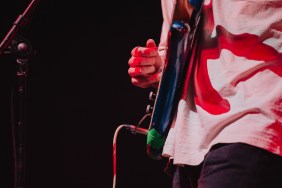Singer-songwriter Alex Lahey has penned an open letter to Prime Minister Scott Morrison with a proposal in order to advance the conversation about providing a roadmap for support to workers in the entertainment sector, who are currently without income for the foreseeable future due to the effects of the coronavirus pandemic and subsequent restrictions and border closures.
“Since the advent of the COVID-19 pandemic, we have known and acknowledged that the arts and entertainment industry would be the first to go down and the last to come back,” Lahey starts the letter.
“Despite this awareness, very little had been done by our Federal Govenrment to prop up this multimillion-dollar, world class commercial sector, which finds itself decimated after a year and a half of closure with no end in sight.”
Lahey goes on to ask what the roadmap for providing support to the industry looks like, acknowledging the necessary snap lockdown strategies but also pointing out that “tens of thousands of gigs” are being cancelled with each month that passes.
“Despite the turmoil we face as a collective and as individuals within our industry, Federal Government promises continue to be broken and schemes have been left behind,” she continues. “The Federal grants program structure has failed to prop up our industry – the trickle-down intentions of this scheme have not come to fruition, leaving performers, crew and venues empty handed.”
Lahey references a letter sent to Minister for Arts Paul Fletcher by Sophie Kirov of Lost Motel, arguing that in four rounds of RISE funding, Contemporary Live Music has received $44 million in funding across 69 events, but that only 10 of those have been seen to execution and suppliers and crew being paid. Only 3% of the total $200 million in RISE funding has been “disseminated downstream” to live music businesses, it argues.
Lahey then proposes a Federal Government-led insurance scheme and wage subsidies program for the arts and entertainment industry. “Without funds getting directly to the artists, performers and crew members throughout this crisis, the industry is eating into itself, running the risk of leaving our country void of a generation’s worth of live performance talent and crew,” she writes.
“There need to be structures in place that ensure prompt and direct reparative financial support for businesses and individuals in the event that gigs, tours or festivals cannot move forward due to outbreaks. Further to this, a wage subsidy system will allow for workers and performers to make ends meet during inevitable capacity restrictions as we emerge from lockdowns.
“This system will keep venues alive; it will keep performers on stage, it will keep crew in jobs – and most importantly, it will keep our rich, vibrant and unique performance culture flowing throughout the veins of our country.
“The creative community has been stood down and overlooked. But it’s time for us to stand up and call out for what we need. I hope our government will listen and come to our aid,” Lahey concludes.
Lahey’s call for a government-backed insurance scheme add to a chorus of similar calls. Earlier this year, for instance, support for a scheme was reignited following the shock last-minute cancellation of Bluesfest in April. “The music industry is full of viable profitable businesses unable to function because of public health,” Shadow Minister for the Arts Tony Burke said at the time. “Govt has a COVID insurance system for the film industry. Music needs one too. Urgently.”
Earlier this month, a number of Australian live music organisations called on the Federal Government to implement a government-backed scheme, with Live Music Australia, ARIA, APRA AMCOS and more releasing a joint statement asking for the government to provide “certainty for the Australian live music and entertainment sector.”
You can read Lahey’s letter in full below.
An open letter to Prime Minister @ScottMorrisonMP with a proposal to continue the conversation regarding a more effective and direct roadmap for support to workers in the entertainment sector who have found themselves without any foreseeable income due to continued closures pic.twitter.com/14Bd0yRbOX
— Alex Lahey (@AlexLahey) August 16, 2021












